Herbs for the New Mama
At long last, A Year of Herbs begins! Thanks to all who entered the herbal prints giveaway. The lucky winner is Kate (jknh78@), who will soon be receiving her choice of beautiful art prints from L.Herbert Designs!
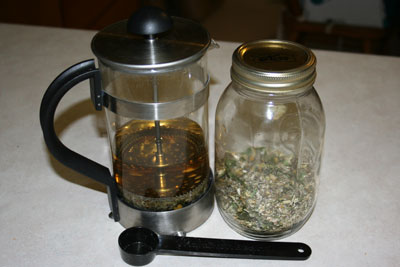
Though I am eager to begin to study about individual herbs and their specific uses, my formal study of herbs has begun in a much more practical manner… finding and learning to use herbs that are helpful for both mother and baby in the early weeks and months after birth!
I've mentioned a couple of times that life has been particularly busy and stressful over the last month or so, just with some current circumstances, recovering from giving birth, and adjusting to life with a new (and fussy) baby in general and I have been feeling quite worn out as a result. In the midst of all this I was beginning to really struggle with my emotions– sad and weepy one minute, angry and very irritable the next. I felt perpetually overwhelmed and like I was breaking a bit under the pressure of it all. In speaking with my husband and midwife, I recognized that what I was experiencing was the beginnings of post-partum depression.
I am so grateful to have realized this before things got any worse. My midwife encouraged me to discuss with my husband how I could find more times for rest and just ways to feel more like myself again and remove some of the stress I was feeling (which we did, and he was so supportive and loving to allow me to do that). She also gave me the go-ahead to do some research into herbs that I could try, that might assist my body in coping with the stress, bringing my hormones and emotions more under control, and just continuing to strengthen and rejuvenate my body so that I could better handle the demands that were on me.
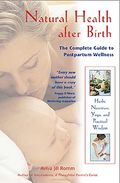 I borrowed a book from the library called Natural Health after Birth by Aviva Jill Romm, a practicing midwife and herbalist. The focus of the book is on the post-partum period, a season of life that is often overlooked by most people, including new moms (and yes, especially me!). A wonderful aspect of the book is the use of herbal remedies to aid the mother's body in recovering physically and emotionally, as well as for increasing milk supply, helping fussy and colicky babies and more (though I can't recommend the book in it's entirety, as she is not a believer and there are some new age aspects of the book in some chapters).
I borrowed a book from the library called Natural Health after Birth by Aviva Jill Romm, a practicing midwife and herbalist. The focus of the book is on the post-partum period, a season of life that is often overlooked by most people, including new moms (and yes, especially me!). A wonderful aspect of the book is the use of herbal remedies to aid the mother's body in recovering physically and emotionally, as well as for increasing milk supply, helping fussy and colicky babies and more (though I can't recommend the book in it's entirety, as she is not a believer and there are some new age aspects of the book in some chapters).
With the blessing of my midwife, I decided last week to put together one of the herbal tea mixes in the book, intended for helping with the symptoms of post-partum depression. Here is what I put together, partly from one of the book's specific recipes, and with some of my own substitutions (due to not being able to easily purchase all of the exact suggested herbs).
Keeping-Your-Balance Blend (slightly altered)
2 parts chamomile flowers (for relaxation)
2 parts nettle (for nutritive purposes, includes trace minerals and vitamins, to treat anemia, weakness and stabilize blood sugar. Also helpful for those feeling stressed and physically or emotionally drained)
2 parts peppermint (to energize and also soothe the nerves at the same time)
2 parts red raspberry leaves (rich in minerals, tonifying to the uterus, aids in balancing hormones, as well as adding a nice flavor to the tea)
1 part dandelion leaves (highly nutritive with trace minerals and iron)
I also added in:
2 parts catnip (a nervine herb, meant to relax and de-stress)
1 part yarrow (for reproductive organs and hormone balancing, immune boosting and digestion)
I mixed all of the dry herbs together in a glass jar and keep it on the counter with a measuring spoon. Whenever I want to make some, I boil some water and place 1 Tbsp of tea per cup of water into a french press. I let the kettle sit for a moment after turning it off so that it is no longer at a rolling boil (because this can damage the volatile oils in many herbs and reduce their effectiveness), then pour it over the herbs. With the lid on (but not pressed down), I let it sit and steep for 10-20 minutes before pressing it and pouring myself a mug. I aim to drink 2-4 cups of this tea a day.
**The original recipe did not include the catnip or yarrow, and also includes 2 parts of chrysanthemum flowers (for anger, stress and related emotions), oatstraw (nutritive, provides vigor and energy) and strawberry leaves (as a tonic and for nerves), and 1 part of both gingerroot (improves and stimulates circulation) and rose petals (relaxation, taste and possibly hormonal balancing). One substitute for oatstraw is to simply eat more oats, as they also contain most of the same qualities.
I am amazed at how much better I am feeling after only a week! Of course, it is not just the herbs. I have really been crying out to the Lord in prayer, playing worship music and meditating on Scripture truths, talking about how I'm doing with my husband and several friends, as well as just trying to take little breaks whenever I feel my emotions starting to rise up and become out of control.
I do feel, though, that the herbs I've been taking this past week have contributed to feeling much more calm and emotionally steady and more physically well than I did before. There have been many trying moments, but in general, I don't feel as overwhelmed as I did before and am more able to use self-control in how I respond to difficult situations.
As I've been reading and studying more about herbs lately, I've also been coming across some others that may be particularly useful for new mamas:
Nutritive (herbs with nourishing qualities, including protein, vitamins, minerals, etc.): Alfalfa, Ashwaganda, Gotu Kola, Hawthorn berries (and leaves and flowers), Milky oats (and oats in general), Nettle, , Red Raspberry leaf, Rose hips.
Nervines (herbs which support the nervous system, have a calming effect and help to relieve stress and tension): Ashwaganda, Catnip, Chamomile, Hops, Lavender, Lemon balm, Milky oats, Motherwort, Skullcap, Vervain
Galactagogues (herbs which support the nursing mother, particularly with maintaing an ample milk supply): Blessed thistle, Dandelion leaf, Fennel, Fenugreek, Nettle, Saw palmetto, Vervain, Vitex (this one is a little more controversial)
Herbs to AVOID while nursing:
Alkanet, Aloe Vera (externally is fine, but not internally), Aloes, Basil (as a food seasoning it's fine), Black Cohosh, Bladderwrack, Borage**, Bugleweed, Cascara sagrada (again, externally is fine), Chinese rhubarb, Coltsfoot, Comfrey**, Elecampane, Ephedra, Garlic (as with basil, fine for use as a food seasoning or ingredient), Joe Pye, Licorice, Male fern, Pugring buckthorn, Senna, Stillingia, Wormwood.
**I have seen conflicting information about comfrey and borage. Some books say they are fine, and even recommended for use as galactagogues. However, Romm suggests in Natural Health after Birth that they should not be used, though no specific reasons are given and I cannot seem to find any in my own research. I will have to continue to study, and so I can't really recommend them to you, one way or the other. Use your discernment in choosing whether to use them or not.
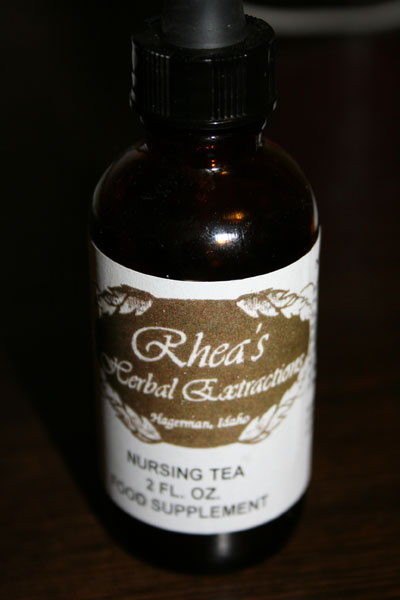 I am currently also taking a herbal nursing tea, made by Rhea's Herbals Extractions (the products are great, but the site doesn't offer much information). I began taking it right after Johanna was born, to help establish a really solid milk supply, something which I struggled with a bit after Caden's birth for various reasons. It includes:
I am currently also taking a herbal nursing tea, made by Rhea's Herbals Extractions (the products are great, but the site doesn't offer much information). I began taking it right after Johanna was born, to help establish a really solid milk supply, something which I struggled with a bit after Caden's birth for various reasons. It includes:
Red Raspberry, Chamomile, Lemon Grass, Borage Leaf, Fenugreek Seed, Star Anise, Marshmallow, Coriander, Fennel Seed, Galega.
I have found that, despite feeling quite stressed and busy (usually not helpful for maintaining a good milk supply), I haven't really had any problems with having enough milk. There have been only a few days (and really, only one or two feeds on those days) where I felt it was a bit lacking, and I usually felt that was in response to me being too on-the-go, and not having had enough to eat and drink.
For more great information on maintaining a good milk supply and a wonderful recipe for homemade mother's milk tea, check out this post.
My next herb post will focus on some things that I have been learning about herbs for soothing the fussy, colicky or restless baby!
Has anyone else found herbs to be helpful in recovering after giving birth, for post-partum depression or for increasing milk supply?

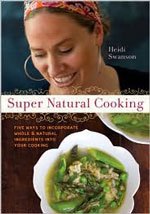
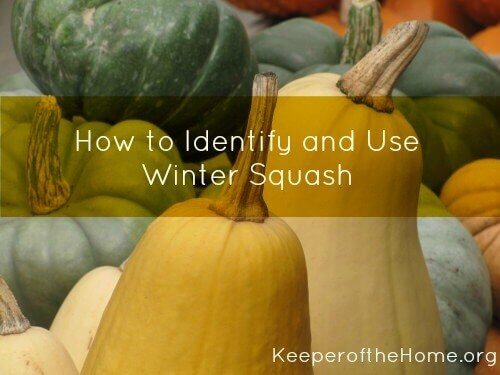

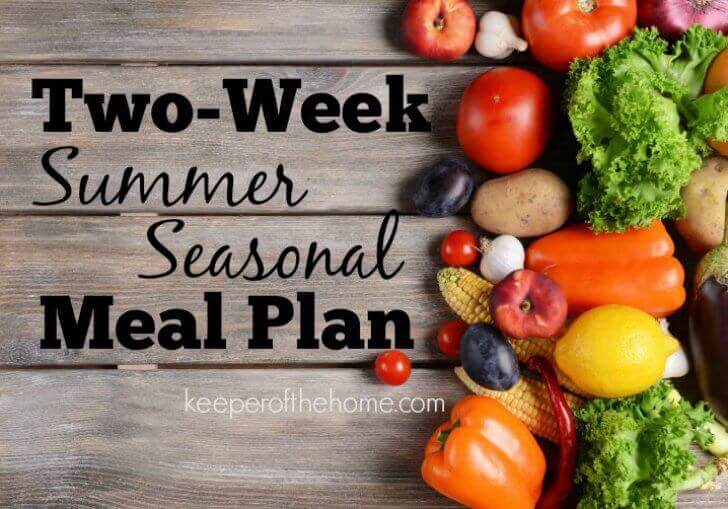
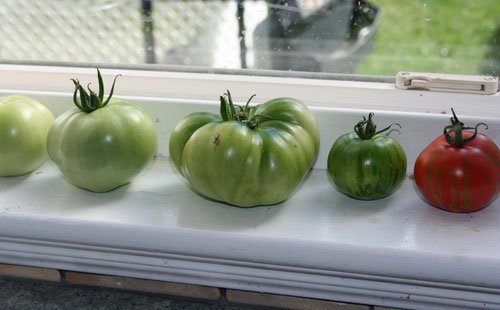

For those who do not want to mix their own, the company Earth Mama Angel Baby has a line of herbal teas that are delicious. These are high-quality teas made with the whole herbs. They have teas for pregnancy, postpartum, milk supply, and even teas to help cope with loss. I have used them with all 4 of my babies. I used to mail order them, but am now starting to see them in health food stores, and even at Babies R Us last week! With baby #4, I finally learned my personal secret to overcoming PPD – sit and snuggle with baby, and let the house fall apart! More snuggles = more happy mommy. He’s 6 months old now, and life is back to normal, and we are both healthier and happier due to the abundance of early snuggles!
Hi Stephanie;
This is a very interesting post.
I have had post partum depression to one degree or another 5 times (!) Mine comes out differently from what you have been experiencing. I can’t sleep when I hit the six-week post partum mark. Not even a wink. I looked into various things but I was so overwhelmed with the conflicting information out there that I took the easy route. I’m on medication and I hate it. But I can’t seem to function without it. When my baby is about nine months to a year I wean off of it. It is very related to hormones as I can’t sleep before I have my period either. (That I can handle because I know it’s a temporary thing.)
I’m not sure where I am going with this but I have a few questions for you. Where do you buy your herbs? How do you know that what you are taking isn’t affecting your breast milk?
Hmm, I though I had a few more questions but I hear my baby crying, so I best be going 🙂
I am INTRIGUED! Thank you for this post. I think it is so important for us women to be in tune with our bodies and aware of the different options God has provided us with to nourish our bodies. I am excited to continue reading as you explore the world of herbs. I will definitely be learning from you and experimenting myself.
I am curious to know how much herbs cost. I’m sure you will be touching on this in your coming posts.
I am happy to hear you are feeling more like yourself. I am a mom of 3 who are now all in school (10, 8,6) I remember the days of young kids and babies, they were some of the hardest I have ever had, but at the same time most precious.
I remember when I was in that stage hearing Dr James Dobson say “the hardest workers I know are moms with young toddlers and babies” I felt so validated and agree with him! God bless you and may He give you extra strength and extra SLEEP!:)
The first two weeks I have a very hard time sleeping more than half an hour at a time. My adrenaline kicks in and it eventually leads to extreme exhaustion/moodiness. I found drinking two to three cups of tea every day for the first three weeks or so to be really helpful. One or two glasses of red raspberry leaf, one glass of camomile or sleep time (a mix of camomile, peppermint, rosehips, and a few other things). I also thinking adding cinnamon to things helped keep me going (supposed to even out blood sugar). I know it’s not a herb, but I found one thing that was probably the most helpful in keeping me relaxed and enable better sleep, was taking a tea from calcium/magnesium powder from Choices right before bed or in the night. It was also a huge help during pregnancy. Again, not a herb, but I really found eating alot of beets helped to clean the body out after labour. Chopping and roasting them int eh oven with a bit of olive oil for 45min is easy and very yummy. One other thing I invested in was a whole foods multi, which also contains vitex agnus, which is apparently good for enriching milk and hormone stability as well.
Hi Stephanie –
Sleep was a huge issue for me. I finally got a prescription for L-Tryptophan. It’s an amino acid – the same thing in Turkey and it boosts melatonin production to help with the deep sleep. It is safe to use while nursing and even during pregnancy. I found that while I was getting the deep sleep, I wasn’t knocked out cold like a typical sleeping pill will do to you so I could still wake up enough to when my baby was crying in the night to be fed. And then I could get back to sleep after, which was also a problem for me. A word of caution: don’t buy the 5-HTP that the health food stores sell – it’s not the same thing. 5-HTP doesn’t cross the blood-brain barrier so won’t be effective. For the L-Tryptophan you need a prescription from a GP.
The other thing I use that I have noticed makes a BIG difference in balancing hormones is Maca. I’m not sure if it is good to use while nursing – you’d have to check into that.
Hi! I’m a lurker coming out of the woodwork (Alisa’s sister :)) On the topic of a fussy baby…I had our forth child last December and she was very coliky (sp?). She cried almost all the time when she was awake and wouldn’t calm in my arms which was difficult to say the least. Someone suggested going off milk and all milk products as some babies are sensitive to the milk protein. You may already know this – I’m not sure what you’ve tried and you’re very well researched but for me and our daughter it made a world of difference. It changed within a few days! I went from having a baby I hadn’t really had any good moments with to a fairly calm one (although I must say she’s still more work than our other three were but I think that’s character 🙂 )
I struggled a lot with a low milk supply with my first baby…a lot of it was due to the fact that she was happier with a bottle (she was a NICU baby for a week) and didn’t care whether she got formula or mommy’s milk. Because of that, I gave up too easily and would give her a bottle if she was still fussy after nursing. I lost my supply when she was 6 months old. My son nursed right away and refuses the bottle so I just nurse him on demand. I discovered that I have a very strong let-down, which means the baby gets all the milk he needs in about 3 to 6 minutes on each side (I can pump 5 ounces in 4 minutes). Not being able to give him a bottle really helped me because there was no other option for him, he had to nurse if he was hungry. He’s almost 7 months old now and he nurses every 3 hours and sleeps an 8-hour stretch at night (8 to 4). I’ve just started feeding him two small meals as well (I was worried this would affect my supply too) and he’s not a fan of pureed foods anyway, so that’s okay with me. All that to say, herbs and drugs never worked to increase my supply. As long as I stay fully hydrated and relatively rested it stays okay. I tried fennel, brewer’s yeast, alfalfa, and all those herbs when I was trying to nurse my daughter and it maybe increased my supply by an ounce per day.
Hi Stephanie,
B vitamins are very very helpful after you have a baby. Pregnancy, nursing, stress get our B supply low which then is hard for us to handle the stress of a new baby & other children in the home! I feel so much better after a baby when I take B’s. Radiant life has a great “stress B” It is liquid so it goes to your system quick. Whole Foods has a great stress B as well in their brand but it is not as good as the other but close. Another VERY helpful thing to take for any lady is calcium glucante. It is very good for the reproductive system & getting you where you need to be…balanced out. I can tell a differnce when I take them & when I don’t. Of course avoiding sugar during this time is best too, & avoiding chocolate is best too, plenty of rest& just praying to the Lord for wisdom. Remember it is okay if the laundry is not caught up, ok if the house is a mess, & ok if you don’t blog for a week or month! The best thing is to get you back in full strength! Rest , seek the Lord & enjoy your family!
Your little one could have a little food intolerance too. Our baby was VERY fussy until we realized dairy was a issue. We buy raw now, but he can’t even handle store butter. He gets very fussy!
Blessings,
Jessica
Blessings to you Stephanie! I personally know how hard it can be to even admit that you might be experiencing some depression, so kuddos to you my dear!! I dealt with some depression right after both of our boys were born. The depression did not surprise me as much as did the anger. I am not an angry person at all and so this was a very new emotion for me!
You are taking some great steps to help yourself and your family through this season in your life! This too shall pass!!
Hi, Stephanie! Thank you SO MUCH for this timely post! I have experienced post-partum depression after each pregnancy–with my oldest son, it was absolutely debilitating, and I was actually slipping into the post-partum psychosis, which was possibly the darkest and scariest time of my life! I really believe that proper nutrition and care of the body does help. I did experience this depression again with my second baby, but it was much less severe, and as soon as I began proper treatment (rest,prayer, good nutrition, etc..) it disappeared! The months after pregnancy should be joyous, and women who experience this are being robbed of some of the happiest moments of their lives. I am definitely going to try your tea after I give birth to baby number three (7 weeks left!!). Also, I have a couple of questions for you: Have you heard that moms who have pregnancies in close succesion are more likely to suffer from post-partum depression? I’m curious because my babies will only be 10 months apart. Also, what do you know about using cod liver oil to treat post-partum depression? this was recommended to me. Thanks, and keep taking care of yourself!
This sounds like something that might be helpful even now, when my youngest has just turned 1! Thanks for sharing the recipe.
My kids & I are reading a book called The Kid’s Herb book, and we’re all enjoying it together. Might be worth checking out, if you haven’t read it already. :o)
Hi Stephanie, so excited to win the lovely prints! Shall I email you my address? Thanks 🙂
I am so glad that you are doing better. For the fussy baby have you thought about a chiropracter? We have here in Texas that specializes in woman and children. My friend brought her fussy baby and what a difference it made.
Blessings
Thank you for this post! I will definitely keep this in mind as my little one is due in five short weeks and I know that I am going to have a rough couple weeks after it comes.
I do have a question though. Do you know of anything to help out with the stuff you mention before the baby is born. I have been having a hard time keeping my emotions under control right now and its wearing on my family. I am doing my best to keep the Lord at the for front of everything but thats hard to do when my daughter (who is 14 months) likes to push every limit that I place in her way and I am just tired and uncomfortable from being 8 months pregnant.
I love your post esp since I am trying for my 2nd child and experienced a tough patch w/ PP. I would love it if you could solicit ideas on curing pregnancy illness, other than prayer I am at a loss and very nervous since last time it was deathly ill for 5.4 months.
Thank you for blessing me daily!
Thank you for sharing!
I have used some herbs a bit, but not much. I’ve used red raspberry while pregnant, and used nettle tea after birth for a few months with my first due to low iron, mainly…also I was struggling with post partum depression too.
I’ve also used some herbs to soak in for the bathtub, to help with healing a badly torn perinium with baby #1.
I haven’t used any herbs in a while, but I’ve really been struggling with emotions lately too— and wondering if maybe it also has to do with post partum stuff as I know I have sort of dealt with that on and off. I will have to look into these things more. THanks for sharing!
I had a midwife and homebirth with #3 (and recently #4 on Aug 15) and used a tincture of st. john’s wort for the ‘baby blues’. My PP experience with her was like night and day, compared to the first 2! I took the tincture less and less for about the first year or so. It really balanced me out, made the ‘overwhelming’ much more handle-able, and I stayed more positive.
Also, my ‘prenatal tea’ has been nettle, raspberry, alfalfa, and comfrey – including for the post-partum period. I think comfrey is now terribly controversial because while it’s been used for millenia, suddenly it was discovered that one element in it is a known toxin, so now it’s “DANGEROUS!” Well, maybe, but maybe it’s not so bad as one part of a whole herb??
I love reading all the comments! This time round, I went out and bought Fenugreek seed capsules (610 mg each) and I find if I take those twice in a day, the next morning has a very noticeable milk boost. The pharmacist also recommended Blessed Thistle as well. Seems to work like a charm!
hi i just want to let you know that i linked your blog to my blogroll. thanks for inspiring mommies like me!Blessings!
This was wonderful Stephanie! I loved reading about all of it!
I have also just begun looking into herbs this past year and I am so shocked that we don’t hear more about it! What blessings from God!
I recently ordered something from Rhea’s for the first time!
I am excited that I have a few of the herbs you listed at our home in bulk (Azure) and will try to make my own tea to help with just being a mama! =)
I have been meaning to get a french press too as the tea “ball” that I have been using is frustrating me!
Wow, that book sounds wonderful! If I have another baby (I hope so!), I’ll have to read it!
Thanks for all the great info!
I have a 12m old baby girl. Post delivery I used to have atleast 2 cups of fenugreek tea – soak 1 tsp fennel seeds overnight, heat up a min or so and brew for another 5.
Another tea was ‘ajwain’ (carrom) – this is supposed to help in reducing gas for the baby. You can also use fennel seeds instead.
All these are available in an Indian grocery.
I also made sure to drink lots of nutritious liquids – milk, soy milk, buttermilk etc. In India we are also given a lot of dry fruits and nuts during this period – I made a powder form that I used to add to my cup of milk.
One good practice I followed was to sit with my drink whenever I fed the baby – that way there was no reason to miss a drink!
Please do be careful with herbs that you in take. Let us all do extra research before in taking new herbs! It’s better being safe than sorry. 🙂
@Kim @ Antiopes, Absolutely, it’s so important for people to do their own research on herbs!
Hi! I’m so sorry but I’ve read both of your blogs about these herbs and tea but for the life of me I can’t figure out if the recipe above is for a colicky baby too? I see that you mention how good it is for momma but can’t see if it is also what helped clear up your baby girls acne and helped colic. Thanks for posting this- such a blessing to my weary heart.
Amy
@Amy, Try this post, it’s more specifically about herbs for babies:
https://keeperofthehome.org/2009/10/herbs-for-the-fussy-baby.html
DO you know if Milk Thistle in supplement form is safe to take during pregnancy or nursing?
Thanks for your help.